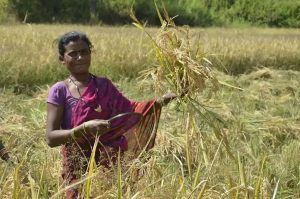FPOs — Genesis and Evolution

Photo by Akash Badave of Bhoomgadi
A farmer producer organisation (FPO) or simply a producer organisation (PO) is a collectivisation of the primary producers. Quite unlike the name, they can be farm or non-farm related producers. It is not unnatural to collectivise say even rural artists or weavers to form a PO. A PO has existed either in the form of the traditional co-operatives or as the modern producer companies. The primary objective of any PO is to improve the income levels of producers by nurturing their own organisation. Be it the input or the final produce, it is difficult for an individual marginal farmer to travel from farm to consumer by avoiding all the intermediaries [1]. Most of these ‘middlemen’ do not have a transparent transaction with the small producers which results in these small producers getting a very small percentage of the overall price value of what the end customer pays. Forming an FPO is a great avenue for the small producers to come together and reap the benefits of economies of scale. A producer organisation is also one of the most democratic ones in the sense that the ownership lies with its members. Thus, it is an entity for the people, of the people and by the people; and also considered as the organisation that can protect the rights of the small and marginalised [2]. The question here is whether FPO is a niche concept or whether it is a resilient model that can translate impact on the ground?
Although the name FPO might have been coined only a couple of decades ago, the concept of collectivisation has existed for more than a century — in its most rudimentary form of the co-operatives. The journey of the co-operative movement in India started under the British rule in 1904, with the passage of the Cooperative Credit Societies Act. The main idea was to bring people together, raise a small token of funds as equity and serve the purpose of collective buying and selling. Post-independence, the co-operative model started displaying unintended consequences.
Co-operative leadership eventually started widening disparities. Bigger landholding farmers started aiming for this leadership and cooperatives became a gateway to the political system [3]. Mutuality in the system started depreciating. The adage ‘each for all and all for each’ which was the basis of a cooperative structure started losing its relevance. Rich and powerful only grew stronger while the small and marginalised, despite being part of a collective, grew weaker. Producer Company is the latest nuanced legal structure in which a producer organisation can exist in the country. This provision was enacted in the year 2003 under the Companies Act of 1956. Every member in this form of a company can exercise only one vote. This made a producer company, by inherent design, bring justice to the mutuality issue of the cooperatives. The focus here is to improve the efficiency of the producers and treat the organisation as a professionally run and managed business in comparison to the co-operatives. Such structural form have been implemented in other Asian countries like Sri Lanka [4].
The major challenges in any form of producer organisation includes — lack of working capital, access to cheap credit, lack of business acumen among the board of directors and leadership. Since 2014, a lot of impetus has been laid on strengthening the FPO movement in India and the goal so far is to further, create and nurture 10000 FPOs among the tribal and 100 aspirational districts of the country [5]. We believe this will also serve the agenda of financial inclusion of the small and marginal communities apart from increasing their income levels.
References
[1]. Patibandla M and T Sastry (2004): Capitalism and Co-operation: co-operative institutions in a developing economy, Economic and Political Weekly, July 3, 2997–3004.
[2]. Trebbin, A and M Hassler (2012): Farmers‟ producer companies in India: a new concept for collective action? Environment and Planning A, 44, 411–427.
[3]. A Brief History of Co-operative Movement. https://shodhganga.inflibnet.ac.in/bitstream/10603/62347/9/09_chapter%203.pdf. Accessed on 7th June 2020.
[4]. Shukpal Singh and Tarunvir Singh (2013): Producer Companies in India — A Study of Organization and Performance. CMA Publication No 246.
[5]. Launch of 10000 FPO Scheme. https://www.financialexpress.com/economy/pm-modi-launches-10000-farmer-producer-organisations-move-to-turn-farmers-into- businessmen/1885160/. Accessed on 7th June 2020.
This research was developed as part of the Bharat Inclusion Research Fellowship.
